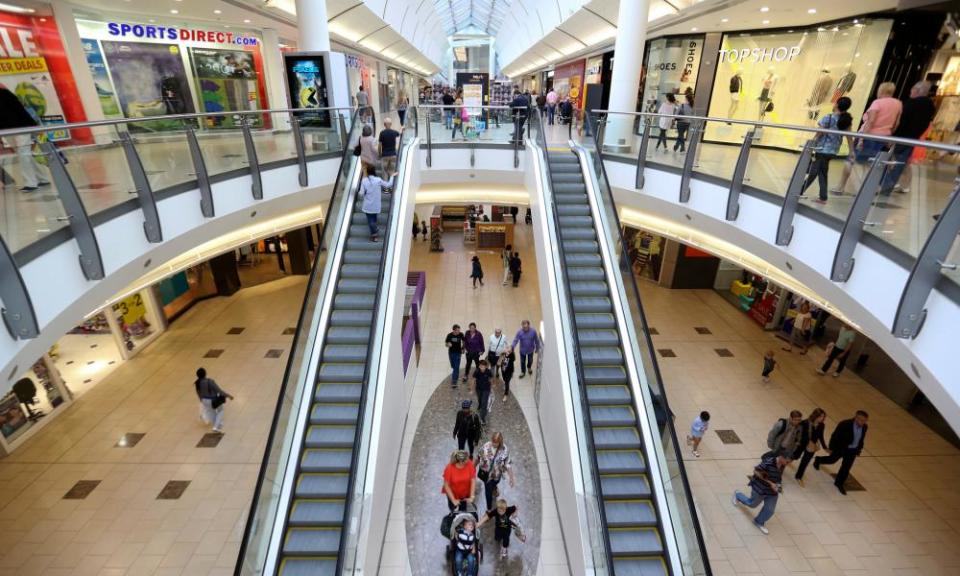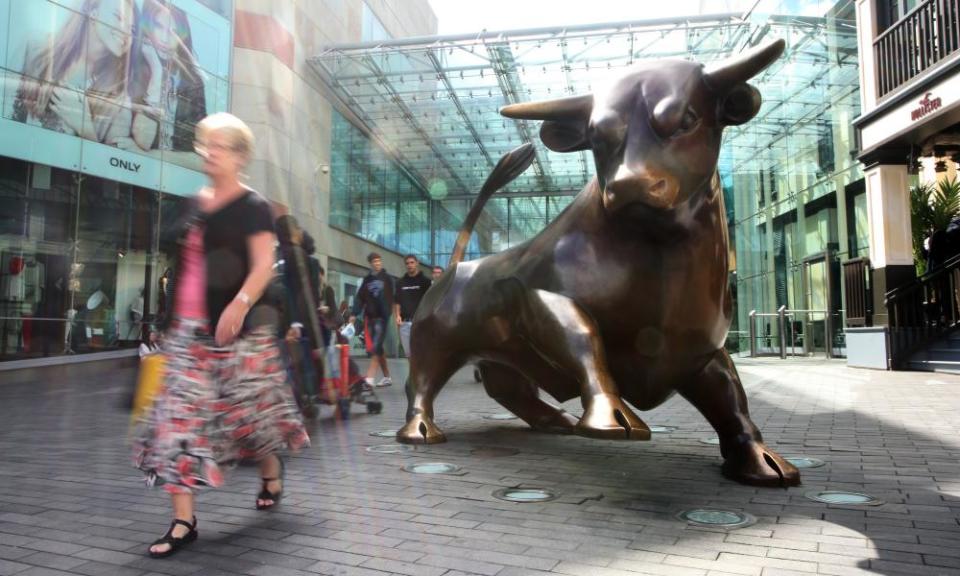Intu the unknown: retail landlord faces up to a fundamental threat

On a midweek evening before the first payday after Christmas, the Lakeside shopping centre in Essex is buzzing with couples, teens and families with their children. They are browsing the shops, but not everyone is buying.
Becky lives not far from the centre in east London and is visiting with her three-year-old daughter and sister to “kill a bit of time”. “We come here all the time,” she said, “not even for the shopping. We come here mainly to eat. The free parking is a huge draw.”
The mall has the same appeal for teacher Jane, who was there to meet a friend: “We’ve just come for coffee and a chat,” she said. “In the local town centre everything is shut after 5pm.”
Lakeside, boasting shops, restaurants and leisure outlets, is one of the jewels in Intu Properties’ crown, ranked the fifth-best UK shopping centre by research firm GlobalData, after competitor Westfield’s two London malls, Bluewater in Kent and Intu’s own Trafford Centre in Manchester.
But not all of Intu’s 14 UK centres rate as highly as Lakeside, and the firm is struggling under the weight of its debt, last valued at about £4.7bn.
The company’s share price has plunged by 90% in the last 12 months as some of its biggest tenants have struggled.So-called “anchors” such as Debenhams, House of Fraser and Topshop’s owner, Arcadia, have all resorted to emergency restructurings, closing some stores and requesting rent reductions on others.
A potent cocktail of the shift to online shopping, rising costs for retailers who run bricks-and-mortar stores, and a reluctance among consumers to spend has led to financial difficulties at national retail chains, hitting the very heart of Intu’s business model as an owner and operator of shopping centres. In the past it could have relied on ever-rising rental income from the firms that rent space in its malls, as well as the increasing value of its property portfolio – officially valued at £8bn but now worth a lot less.

The group has invested money to offer more than just shopping to its visitors, such as the £72m leisure extension at Lakeside, which opened in 2019 with a Nickelodeon adventure centre featuring TV-themed activities, plus mini-golf and indoor trampolines. But the slump in value of the shopping centres, and rise in corresponding debt secured against each of them, could be enough to send chief executive Matthew Roberts to the “calm house” – a quiet space currently at Lakeside where visitors can sit in a blue-lit room and enjoy the sound of waves.
In its most recent presentation to investors, Intu said fixing the balance sheet was its number one priority. It has been selling assets in an attempt to bring down its debt from 58% to 50% of the dwindling market value of its properties, but the company’s share price has crashed to about 13p from 119p over the past year, valuing the business at just £172m.
To help address its problems, Intu has confirmed that it will be issuing a cash call to investors alongside its full-year results, which are due in the second half of February, but declined to put a number on it.
In other cash-raising measures, since the beginning of the year it has sold two of its three Spanish shopping centres: Intu Asturias in Oviedo, which delivered net proceeds of €85m (£72m), and Intu Puerto Venecia in Zaragoza, which brought in €115m.
Property analysts have estimated that Intu needs to raise between £1bn and £3bn in its upcoming cash call.
“£1bn won’t be enough”, said Jonathan De Mello, head of retail consultancy at Harper Dennis Hobbs.
“It is the right strategy, but disposals aren’t enough. They could also look to halt or delay their development work.”
The group has been given the go-ahead for an €800m (£677m) “retail resort” in Torremolinos on the Costa del Sol, and has submitted a planning application for the expansion and refurbishment of Lakeside.
Intu needs closer to £3bn to get on top of its debt, according to Aaron Guy, a property analyst at Citi. He expects the group’s property values to fall by a further 35%, and believes failure to reduce its debt below 50% could lead to expensive “penalty” rates when the company comes to refinance its loans.
Intu’s share price slid further at the end of January when the Financial Times reported that the slide in value of its Metrocentre in Gateshead had triggered a covenant in its largest bond, because the loan-to-value ratio, which compares the value of the property with the amount borrowed against it, rose above 70%.
That covenant could lead to stricter conditions, or a so-called “cash trap”, that could prevent the company from sending cash made from selling its assets to the rest of the group, which would hinder it from paying down its debt.
Intu’s fall from grace has been swift and dramatic. In 2018 it was the target of two takeover bids, but ended up being left at the altar twice in succession. First, rival Hammerson, which owns London’s Brent Cross and the Bullring in Birmingham, pulled out of a £3.4bn deal. Then in late 2018 a consortium including Intu’s major shareholder Peel Group pulled out of a £2.9bn bid, citing concerns related to Brexit.
John Whittaker, the 77-year-old billionaire behind Peel – which holds 27% of Intu – believes in long-term investing, and is understood to support the fundraising plan. Whittaker was behind the Trafford Centre development, which he sold to Intu in 2011, and he has been the non-executive deputy chair on the board ever since.
Intu’s turnaround plan is to own only top-20 shopping centres in the UK, criteria fulfilled by just six of its current 14 centres, many of which are located in smaller cities such as Norwich and Nottingham.

Intu Potteries – a centre that sits on a half-boarded-up shopping street in Stoke-on-Trent – would struggle to get on to a top 20 list. The centre boasts many of the same stores as Lakeside, including Debenhams, Primark, Next and H&M, and also contains a sprinkling of empty units, although it enjoys higher occupancy rates than the surrounding streets.
When the Observer visited, Lyrissa and Matthew Donnelly had been for lunch with their three-year-old daughter Ella at Bon Pan Asian, a buffet restaurant in the mall’s leisure extension which opened in 2015 and where diners were queuing for seats. “We come every week, mostly for food,” said Lyrissa.
Retired couple Chris and Tony Horton said they rarely visited, despite living locally. “They have tried hard with the restaurants and the cinema,” said Chris, “but there’s nothing for us here.” Intu will have its work cut out convincing shoppers and investors to spend their money with it.

 Yahoo Finance
Yahoo Finance 